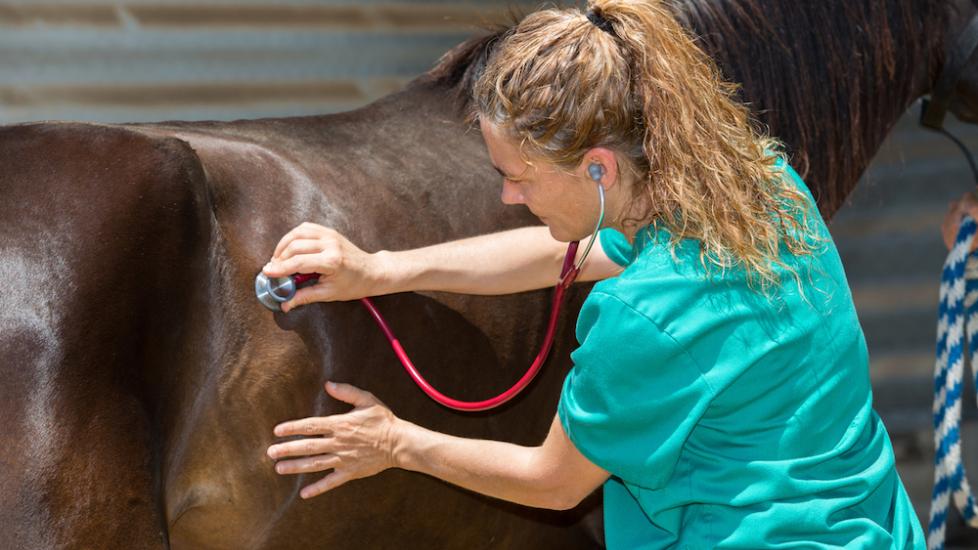Aneurysm in Horses
What Is an Aneurysm in Horses?
An “aneurysm” is an abnormal bulge in the wall of a blood vessel. An aneurysm can occur in both arteries (blood vessels that carry blood away from the heart) and veins (blood vessels that return blood to the heart). They are formed when the pressure exerted by the blood flowing through the blood vessel causes the wall to balloon or bulge out, where the blood vessel wall is weak.
Some aneurysms may burst while others will not. It will depend on the type of aneurysm and the blood pressure going through it. It is impossible to determine what percentage of aneurysms will burst because many aneurysms go undetected and aneurysms in horses are rare.
The most common type of aneurysm in horses is an aortic aneurysm. When an aortic aneurysm bursts, the horse will bleed out internally and die within a matter of minutes. Fortunately, this is a very rare occurrence.
Types of Aneurysms in Horses
-
Aortic: occur in the aorta, the body’s main artery, just as it exits the heart.
-
Cerebral: an aneurysm located in or around the brain. These are extremely rare in horses.
-
Intestinal: due to Strongylus vulgaris, an intestinal worm. The larvae disturb blood flow to the intestines.
-
Venous: bulging of a weakened vein, most commonly a congenital problem of the jugular vein.
Symptoms of Aneurysm in Horses
-
Distress
-
Elevated heart rate
-
Elevated breathing rate
-
Weakness or collapse
-
Muscle tremors
-
Pale mucus membranes
-
Heart murmur
-
Sudden death
Causes of Aneurysm in Horses
Most aneurysms are the result of congenital defects, meaning there was a problem with the way the affected blood vessel developed in the womb.
Infrequently, they can be secondary to other conditions including:
-
Trauma
-
Intestinal parasites (Strongylus vulgaris)
-
Hereditary diseases of connective tissue (i.e. HERDA)
-
Infections in the blood
-
Heart defects
How Veterinarians Diagnose Aneurysm in Horses
Your veterinarian will take a thorough medical history and perform a physical exam. On the physical exam, they will assess the gums for paleness, feel the jugular vein in the neck for abnormal bulging, and feel the limbs for any swelling. Your veterinarian will listen to the sounds of the heart and lungs.
Any abnormal findings will prompt them to recommend an ultrasound of the heart called an echocardiogram. This diagnostic tool will help the veterinarian see the structures of the heart and look for aneurysms in the blood vessels. Despite a medical work up, you will often not know if your horse has an aortic aneurysm until it bursts, at which point it is fatal.
A fecal test is important to run to look for the eggs of Strongylus vulgaris. If the eggs are detected and the horse is exhibiting repeat episodes or colic and diarrhea, your veterinarian may suspect an intestinal aneurysm. However, the only way to confirm a diagnosis of an intestinal aneurysm is with abdominal exploratory surgery.
Treatment of Aneurysm in Horses
Treatment will vary based on the type of aneurysm. If an aortic aneurysm is detected early, medications like diuretics (“water-pill”) and anti-thrombotics (medications to prevent blood clots) can be prescribed to slow down the development of congestive heart failure. Unfortunately, there is no treatment for a ruptured aneurysm as these are fatal.
In the case of suspected intestinal aneurysms, a dewormer and antibiotics are prescribed. Antibiotics will help to prevent any infection that may result from the worms dying. In confirmed cases of intestinal aneurysms, surgical removal of the affected intestinal tissue is required.
Recovery and Management of Aneurysm in Horses
Most equine aneurysms are fatal. Even if an aneurysm is detected before it bursts, the horse will often succumb to the secondary effects of congestive heart failure. During this time, the horse should not be ridden, exercised, or allowed to do any activity that would increase their heart rate. Every effort should be made to keep the horse calm and stress-free. Efforts to manage the signs of congestive heart failure can be made until it is best to humanely euthanize.
For horses with intestinal aneurysms, recovery will depend on the extent of damage that the Strongylus vulgaris larvae have done to the intestinal blood vessels and the resulting damage to the intestines themselves. The prognosis for recovery is guarded in most of these cases. Fortunately, with the routine use of current deworming medications, cases of intestinal aneurysms are very rare. Maintaining your horse on a deworming protocol prescribed by your veterinarian is extremely important to keep the horse healthy.
Aneurysm in Horses FAQs
What causes a horse to have an aneurysm?
Aneurysms may be congenital or secondary to parasitic infections in the blood vessels.
Can horses get aneurysms?
Yes. However, they are extremely rare.
What is the cause of sudden death in horses?
An aortic aneurysm will cause sudden death if it bursts.
What is the common site of aneurysm in horse?
The most common site of an aneurysm in a horse is the aorta.
References
-
Rijkenhuizen, ABM. Equine Veterinary Education. Venous aneurysm of the jugular vein in horses. 33(8):405-409. 2021.
-
Brown, K. University of Pennsylvania, New Bolton Center. Do horses really have heart attacks? Aortic rupture in the sport horse. 2017.
-
Nielsen, M. Merck Veterinary Manual. Strongylus vulgaris - Associated disease in the horse. November 2022.
Featured Image: iStock.com/fotoedu
